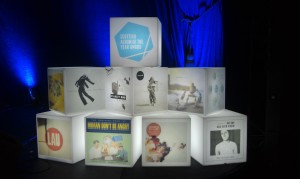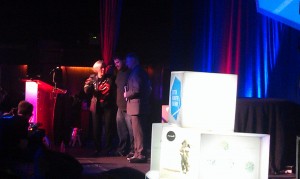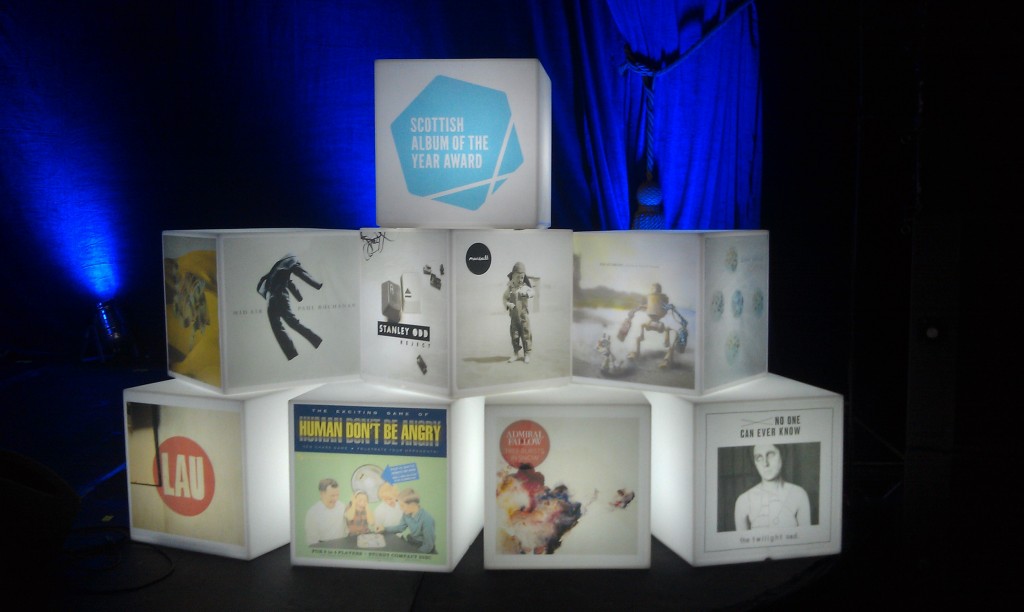 Congratulations to RM Hubbert for his album, Thirteen, Lost & Found, winning the Scottish Album of the Year. It is a well-deserved win, given that that the award is for an ‘album’ and not just a collection of songs. In that respect, Thirteen Lost & Found has a vision and a consistency that endures over repeated listens. The Short List for the Awards was criticised from some quarters of the media for not including albums from the likes of massive-sellers Calvin Harris and Emeli Sandé. But then, do collections of pop songs (as great as some people may deem them to be) necessarily make for a great album?
Congratulations to RM Hubbert for his album, Thirteen, Lost & Found, winning the Scottish Album of the Year. It is a well-deserved win, given that that the award is for an ‘album’ and not just a collection of songs. In that respect, Thirteen Lost & Found has a vision and a consistency that endures over repeated listens. The Short List for the Awards was criticised from some quarters of the media for not including albums from the likes of massive-sellers Calvin Harris and Emeli Sandé. But then, do collections of pop songs (as great as some people may deem them to be) necessarily make for a great album?
In any event, the process by which the award was chosen – albums being first nominated for a long list, which is then whittled down to a short list of ten – should hopefully provide some controversy, or at least public debate. Apparently, setting up the award last year cost Creative Scotland over £93,000, and while a lot of that went directly to the various winners (both musical and visual artists), one would also expect there to be some payback in terms of simply getting more people to talk about Scottish music. It was disappointing then, that on the way to the Awards ceremony our taxi driver neither knew that it was taking place, or which artists were on the short list.
The ceremony itself took place in the Barrowlands Ballroom, an inspired choice, given the venue’s place in Glasgow’s (if not Scotland’s) recent musical history. It was nice to be able to stand in the venue’s main area without being subject to the usual gig protocols of being hemmed into a darkened crowd and then quickly ushered out once the band had finished. Instead, it was possible to wander around the atmospherically-lit hall and through the crowd, who were scattered around a smattering of small tables. The ceremony itself took place across two stages (at either end of the venue) with the normal stage being reserved for most of the live performances and the opposite stage being used for the presentations. Unlike the Mercury prize ceremony, where the actual nominees perform, the SAY live performances were from a variety of different ‘up and coming’ bands including The Young Fathers, Hidden Orchestra and The Dewarists (which is actually a collaboration between Indian folk rockers and various Scottish musicians, including King Creosote). However, Aiden Moffat and Bill Wells, whose album Everything’s Getting Older won the prize last year, did start the show by performing a couple of numbers on the smaller stage. One negative point was the quality of sound, or rather its inaudibility. This was particularly evident through-out the spoken parts of the event, which for the most part was delivered by the presenters Janice Forsyth and Vic Galloway. The problem was not so much with the PA system(s) but with the level of chatter from the audience. Perhaps the Mercury ceremony has the audience sit round large tables for a reason – in that enforced seating keeps the noise levels manageable.
No doubt criticism, from some commentators, will continue about the parochial or narrow nature of the award; particularly now that a Chemikal Underground release has won the top prize for a second year in a row and that, while folk music was represented in the short list, other genres of music were under-represented e.g. classical. However, the SAY awards should provide a platform for discussion about local popular music which is under represented in the media. Perhaps, if anything, it should be the title that changes – to something akin to the ‘Critics’ Scottish Album of the Year’ (though that does not provide such a useful acronym).

